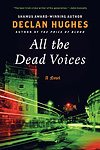Book Review
The Reapers
By John Connolly
Edgar Alan Poe is generally thought to be the founding father of crime fiction, although as befits an often lurid and historically disreputable genre, paternity has long been disputed, with accusing fingers wagging in the various directions of William Godwin, Eugène-François Vidocq and even Wilkie Collins. Certainly Poe's five Inspector Dupin stories are the first detective stories, although he didn't see them in that light, or rank them as highly as his other writing. Poe's roots lay in the Gothic and the romantic, and he produced tales not simply of mystery and imagination but of horror and terror. It was appropriate then that the Irish crime writer John Connolly should make an appearance in these pages recently to review a new biography of Poe, for it has sometimes seemed as if Connolly's entire project has been nothing less than to reintegrate Poe's morbid and sensational asesthetic into the body of mainstream crime fiction.
Not that Connolly is some kind of literary archaeologist or pasticheur; he has simply interpreted the parameters of a genre he prefers to describe as "mystery fiction" rather more broadly than many of his contemporaries. In Connolly's visionary brand of apocalyptic neo-noir, men and angels inhabit the same plane; demons are not psychological troubles but realities; the Gods may be dead, but still, they watch and wait. At the same time, the first five Maine novels, featuring PI Charlie Parker, along with the stand-alone Bad Men, were terrifically exciting, tightly plotted thrillers redolent in particular of the work of James Lee Burke and Thomas Harris: written in an uncommonly fine, supple, sensuous prose, these dark, violent, volatile books worked brilliantly within the genre while consistently provoking and subverting it.
And then something happened. It was called The Book of Lost Things, and it was a work of outright fantasy, a boy's rites-of-passage journey through a fantastical world in order to pick up the pieces of his own shattered life. It was a remarkable achievement, moving Connolly's work onto a new level, and it seems to have had liberating consequences for the books that have followed. Where occasionally in the Maine novels there had been the risk of the supernatural overwhelming the actual, of claustrophobia (The Black Angel sometimes read as if it were channeling Hieronymus Bosch), last year's The Unquiet held the disparate elements of Connolly's fictional universe in a new balance while sacrificing none of the previous intensity: confident, stylish and moving, it was by some distance the best of the Parker series.
That sense of greater harmony and assuredness carries through to The Reapers, a supernatural western set among an elite cadre of samurai-style contract killers and the most purely entertaining novel Connolly has written. The Reapers centres around Angel and Louis, Parker's murderous sidekicks, and the plot has a classical simplicity: Angel and Louis find their lives under threat from men acting for Arthur Leehagen, who seeks revenge for the murder of his son; Leehagen's rival in love and in business, Nicholas Hoyle, hires them to kill Leehagen; Leehagen lives near a deserted former mining town in isolated, open country; a team of assassins is assembled to mount the attack; when they're almost on top of the Leehagen place, Angel and Louis realise that a trap has been sprung, and that their team are being picked off one by one, and that the man on their trail is a Reaper with his own deadly grudge against Louis. The call goes out for reinforcements, the Detective (as Charlie Parker is called here) steps up to help his friends, and the stage is set for a showdown.
But in The Reapers, the men with guns do not get it all their own way. Much of the narrative is told from the point of view of a tenant of Louis's called Willie Brew, a sixty year-old mechanic and Vietnam veteran who never killed anyone but who gets reluctantly drawn into the climactic action alongside the Detective. Brew is a splendid creation in his own right, an ornery, fundamentally decent man, seen to amusing effect riffing Hope and Crosby style with his business partner and unlikely friend Arno; he also enables us to see the bloody climax plain, providing a moral counterpoint to the glamorous allure of violence.
Equally enthralling are the flashbacks to Louis's youth: to the racist America of sundown towns, where a black man was not welcome after nightfall, where a black man who broke the window of a white bar was lynched and burned alive, where Louis killed for the first time to avenge his mother's death, and was marked out and groomed for the grim fate that awaited him. Together they form a poignant backstory that supplies invaluable psychological and social underpinning for this utterly compelling tale of mystery and imagination.
The Irish Times, May 24th












0 Comments:
Post a Comment
<< Home